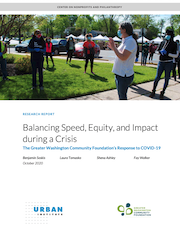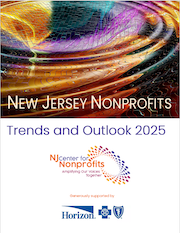Site Search
- resource provided by the Forum Network Knowledgebase.
Search Tip: Search with " " to find exact matches.
As we know, COVID-19 had a significant impact on student academic achievement. School districts across the state and country are working to accelerate student learning with a particular focus on literacy. Join us for our next Newark Education Funder meeting as we explore how funders can support a community approach to literacy, including the recently released Ten Point Literacy Plan. We will hone in on statewide and local data with the support of a recent study published by JerseyCAN, and then discuss how we can collaborate with grantees on systems that complement the traditional K-12 school day, particularly early literacy and support for reading at home, after-school and community programs, and collaborations with institutions like the Newark Public Library.
Panelists:
Paula White, Executive Director, JerseyCAN
Christian Zabriskie, Director, Newark Public Library
Nayibe Capellan, CEO, Programs for Parents
Catherine Wilson, President and CEO, United Way of Greater Newark
Cost: Free for CNJG Members; $50 for Non Member Grantmakers.
This self-assessment/reflection tool is intended for foundations and funders committed to or interested in Doing Good Better. Doing Good Better is inspired by, and builds on, years of nonprofit and community advocacy, the principles of “Trust Based Philanthropy,” and numerous other resources. We hope this tool will open up the opportunity for dialogue and reflection with your board, staff and funded agencies. Your response can serve as a baseline for future measurement of your organization’s progress towards Doing Good Better, stronger philanthropic/nonprofit partnerships, and heightened community impact.
This assessment is intended as a self-reflection tool, rather than a recommendation for any specific policy within a particular funding institution. It has four sections, one for each Doing Good Better goal. For most funders, a single individual in grantmaking or senior leadership will be able to complete the full assessment; others may need additional support from other departments to respond. While filling out the assessment, we encourage you to consider how self-reporting bias may show up in your answers. Also, notice where a question challenges you and get curious about why.
To make the most of this tool, we recommend that you first review and consider the Doing Good Better goals before starting this assessment. We also encourage your board and staff to go through the goals as you reflect on your responses.
• Goal 1: Center Equity
• Goal 2: Provide Flexible Funding
• Goal 3: Provide Reliable Funding
• Goal 4: Reduce Paperwork Burden
DOWNLOAD THE SELF-ASSESSMENT TOOL
Strategic asset allocation is arguably one of the most important, yet least advanced, aspects of investing. The Investment Strategy Group (ISG) in the Goldman Sachs Investment Management Division has developed a new approach to strategic asset allocation, which leverages the idea that long-term investment returns derive from multiple distinct sources called “return-generating factors.” This multi-factor approach is designed to help investors better understand the key sources of long-term return across asset classes and to increase the precision of long-term risk and return estimates. It also provides investors with a new way to think about portfolio diversification, allowing them to focus not only on diversification across asset classes but also
on diversification across the underlying sources of return.
This publication from Grantmakers for Effective Organizations offers a framework for thinking about how to measure progress and results in place-based and community change initiatives.
Community foundations are beginning to deepen and shift how they work, adopting an anchor mission that seeks to fully deploy all resources to build community wealth. Moving into territory relatively uncharted for community foundations, they are taking up impact investing and economic development — some in advanced ways, others with small steps. This report offers an overview of how 30 representative community foundations — including The Seattle Foundation, the Vermont Community Foundation, and the Greater Cincinnati Foundation — are working toward adopting this new anchor mission.
This Democracy Collaborative report was written by Marjorie Kelly, Senior Fellow and Director of Special Projects and Violeta Duncan, Community Development Associate.

The COVID-19 public health and economic crisis has changed our world as we know it. As employers moved to remote work, schools shifted to distance learning, and businesses closed completely, it became clear that the impact on residents, nonprofits, and businesses was far greater than anyone could have ever imagined.
In response to the growing and evolving needs of our region, the Greater Washington Community Foundation established the COVID-19 Emergency Response Fund to raise and rapidly deploy funding to local nonprofits providing food, shelter, educational supports, and other critical services.
From the beginning our goal was clear: to address the immediate needs and reach adversely affected communities, particularly low-income households and communities of color. We know all too well that in a crisis like this, these marginalized communities are hit the hardest, and often take the longest to recover.
In times of crises, The Community Foundation is our region’s philanthropic first responder, bringing together individuals and families, philanthropic peers, corporate partners, and local government advisors to address community issues. Building on our rich history of emergency response work, we grounded our COVID-19 response efforts in a similar coordinated approach.
This report chronicles the steps taken, under immense pressure, to develop a coordinated emergency response effort to support a broad range of needs across the region. Once again this effort has demonstrated that working in partnership and close collaboration with our philanthropic peers and local government advisors is an effective way to manage a response to both urgent and longer-term needs.
Impact 100 Jersey Coast awarded four $100,000 Impact grants and five $1,600 Mission grants at their recent event.
The National Center for Family Philanthropy and Youth Philanthropy Connect, a program of the Frieda C. Fox Foundation, have joined together to bring new resources to the field of philanthropy focused on engaging the next generation of donors and family members. Igniting the Spark: Creating Effective Next Gen Boards is the first publication of its kind, offering a comprehensive overview of the growing practice among family foundations and donor advised fund holders of using next generation boards.
The issue brief outlines creative options for involving children as young as 8 in family philanthropy. It is supplemented by case studies of seven foundations using next gen boards and other approaches for engaging youth in philanthropy. Throughout both resources, the voices of next gen donors describe what works — and what doesn’t — providing family members and staff with guidance and insights new to the field.
A CNJG member queried our listserves with the question "Does anyone have templates that can be used and/or shared related to grant approval letters and terms and conditions related to COVID-19 grants?" CNJG compiled the answers from responding members.

